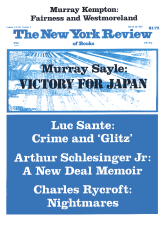In response to:
The Spirit of Croly from the January 17, 1985 issue
To the Editors:
Michael Straight writes in his letter to The New York Review of Books [NYR, January 17] that the spirit of The New Republic, “the journal of opinion founded by my parents and edited in its early years by Herbert Croly…was shattered” when the magazine, “under its present owner, endorsed the bombing of Beirut by the Israeli Air Force.” Straight goes on to say that we refused to publish his letter of protest at the time.
To the last first: what Straight wrote was a private protest letter to me cancelling his subscription. Hendrik Hertzberg, then editor at TNR, thought that sad and asked Straight to reconsider which, without much fuss, he did. Now the truth is that TNR never endorsed the bombing of Beirut by the Israeli Air Force. What we did say (August 30, 1982)—these are my words, as I recall—is: “the moral and political calculus of evacuating the PLO from Beirut is a complicated one” because, unlike Arab armies “which do not hide behind civilians,” the PLO does precisely that. “We are wounded and troubled,” we continued, “by the suffering of innocent civilians in Beirut…. War is monstrous. And war against terrorists who specialize in shooting civilians while hiding behind other civilians is all the more monstrous.”
Still, let us imagine that these ambivalent words constitute a ringing endorsement of the Beirut bombing. What spirit of The New Republic exactly would they be violating? The magazine has had a long and complicated history. For a moment, at least, the magazine flirted with fascism; but it also had a long and disgusting apologetic relationship to Stalinism during many years, including some when Straight was at its helm.
Mr. Straight criticizes the present editors for “respecting power rather than principle, and promoting special interests in place of our general interest.” This is a curious grievance to come from Mr. Straight. As he documents in his book, After A Long Silence, he started his career as a volunteer in Stalin’s espionage network and ended it as an enthusiast and servant of Richard Nixon, who was responsible for the bombings of Cambodia and Vietnam. I leave it to your readers to decide what kind of person it is who gets so exercised by Israel’s transgressions in the world but has spent much of his adult life serenely indifferent, if not sometimes positively exuberant about, some of the great enormities committed by the big powers during the last fifty years.
Martin Peretz
Editor-in-Chief, The New Republic
Washington, DC
This Issue
March 28, 1985



